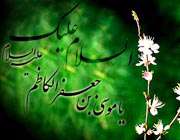Celebrating Imam Kadhim Birthday
7 Safar is an auspicious day. It was on this day that the 7th infallible Imam of the Prophet"s Household was born in the city of Abwa between Mecca and Medina in the year 128 AH (745 CE).
But since the birth anniversary of Imam Mousa Kadhim (pbuh) falls in the traditional mourning season, the faithful refrain from any act of rejoicing. It is the period immediately after the tragic martyrdom of Imam Hossein (pbuh). It is the shocking period when humanity had sunk so low into the abysmal depths of bestiality that the Prophet"s Household including two infallible Imams--Imam Zayn ul-Abedin (pbuh) and his 4-year son Imam Muhammad Baqir (pbuh)--were being dragged in chains through the streets of Damascus to the court of the libertine Yazid bin Mu`awiya.
Thus, out of respect for the sufferings of the enchained grandfather and great-grandfather of Imam Mousa Kadhim (pbuh), as well as that of the entire group of noble captives including the Prophet"s granddaughter Zaynab (pbuh), we forego any kind of festivity.
This lack of festivities is not to belittle the blessed status of the 7th Imam, who was among the select group of divinely-designated leaders of mankind. Unlike the so-called leaders chosen by fallible minds, he was the Imam since the day he was born, and in the manner of Prophet Jesus (pbuh), he spoke the words of truth from the cradle itself.
We are all familiar with the miracles of Prophet Mousa or Moses (pbuh) since the day his mother put him in a basket and set it adrift in the Nile River. But how many of us are aware of the miracles of the "Pride of Moses", that is, Imam Mousa Kadhim (pbuh). The 7th Imam used to converse fluently with people of different nationalities in their own native tongues, the
Bab al-Hawa"ij (Gateway to Pleas) that he is known by, continues to grant succor to those who knock at the door of his shrine in Kadhimayn, Iraq, more than a millennium after his martyrdom.
There is account of a miracle in the bookal-Irshad of the well-known scholar Shaykh Mufeed. The Shaykh, whose veracity was a byword in Baghdad of the Abbasid days, narrates on the authority of Ya`qoub Sarraj that once when the latter visited Imam Jafar Sadiq (pbuh), he found him engrossed in playful gestures with a child in the cradle. He knew it was the 6th Imam"s newborn son, and waited. Then Imam Sadiq (pbuh) turned towards Sarraj and beckoning him towards the cradle said: "Approach your master(Mawla) and greet him." Sarraj says: I went near him and greeted and he replied to me eloquently. Then he (the infant) told me: "Go and change the name of your (newborn) daughter which you gave her yesterday, for it is a name which God dislikes."
Thefaithful Sarraj knew at once it was the future Imam, the 7th one. Not only was the infant"s speech a miracle but also the name of the daughter which he had not yet divulged to anyone.

Restrainer of anger
In 148 AH following the martyrdom of Imam Jafar Sadiq (pbuh), Imam Mousa Kadhim (pbuh) was formally invested with divine trust, at a time when the Umma of his ancestor was passing through a crucial phase. The ruling caliphs had usurped power solely by blood and fire, and were total strangers to the message and teachings of Prophet Muhammad (pbuh) whose mantle they claimed. To make up this shortcoming and to keep the people away from the path of those whom the Almighty has chosen for leadership, they encouraged jurists of questionable standing to form sects and sectarian schools.
Imam Mousa Kadhim (pbuh) was heir to the Prophet"s pristine Sunna, and aware of the dangers of divisive tendencies, ably shouldered the task of carrying on the mission of his forefathers. In the time of Mansour Dawaniqi, he kept a low profile but nonetheless consolidated the circle of close associates around him. He soon won acclaim as "Kadhim" which means
"restrainer of anger".
The Imam enlightened his followers on the dynamics of monotheism and the powers of reason and intellect in order to combat the wayward philosophical ideas and atheist tendencies infiltrating the minds of the Umma. He trained over 300 scholars of repute who wrote books on various branches of Islamic science. Perhaps the greatest of them was Hisham bin Hakam.
After Mansour"s death, his successor Mahdi Abbasi, ever jealous of the Prophet"s descendants subjected Imam Kadhim (pbuh) to oppression and had him brought to Baghdad. In Baghdad the 7th Imam engaged in debates the court jurists and representatives of various schools of thoughts, and exposed their fallacies.
The people began to realize that the genuine Muhammadan Islam lay with the Ahl-ul-Bayt and not with the court sanctioned schools of jurisprudence which were then beginning to emerge and splinter the Umma into sects.
An alarmed Mahdi, aware of the flimsy claims of his own house to the leadership of Muslims, put Imam Kadhim (pbuh) into prison. Later he was released and sent back to Medina. The Caliph was scheming against the Imam"s life when his own accursed lifespan was cut short by the cold hands of death. He was succeeded by his son Mousa Hadi, who during the one-and-a-half year rule stepped up the persecution of the Prophet"s descendants, resulting in the tragedy of Fakh.
Fakh tragedy
The Fakh tragedy occurred in 169 AH, when Hosein bin Ali Zaynul Abidin, tired of the oppression of the Abbasids, took a solemn oath at the shrine of the Prophet and rose up in arms at Mecca, and was tragically martyred at nearby Fakh. The Caliph tried to implicate Imam Kadhim (pbuh) in the uprising but before he could carry out his sinister designs, he died and was succeeded by his infamous brother Haroun.
The new Caliph in Baghdad followed the same policy of persecution against the Ahl-ul-Bayt. He once came to Medina and to impress upon the people of his descent from the Prophet"s uncle Abbas bin Abdul-Muttalib, entered the holy shrine in great pomp and said:
"Greetings to you Prophet of God, greetings to you cousin". Soon however, the Imam (pbuh) entered, and saluted his ancestor"s tomb by saying:"Greetings to you Prophet of God, greetings to you father". Haroun at once turned pale and seething in anger left the shrine. He remembered the incident and tried to find excuses to lay his hands on Imam Kadhim (pbuh).
Some years later, during his next trip to Medina,
Haroun had the 7th Imam arrested and without the people knowing, sent him to Basra to be kept in confinement. For a year, the Prophet"s heir languished in Basra before being brought to Baghdad on the cruel Caliph"s orders. Haroun devised several plans to kill him but failed. Even his jailers refused to harm him.
Haroun once sent a morally loose woman of great beauty to the cell of the Imam in a bid to seduce him. When the jailers went in the next day, they found her to be a completely changed woman; she was so impressed by that spring of virtue and purity, that she had forsaken her evil ways and was praying and seeking forgiveness from God. They threatened her but she was ready to face death rather than stain the raiment of one whom Allah had granted the mantle of purity (Holy Qur"an 33:33).
Haroun becoming despaired of finding any ruse ordered the wicked Sindi bin Shahak to take charge of the Imam and kill him in such a way as not to raise any suspicion of foul play on the part of the Caliph.
Sindi bin Shahak laced with poison a plate of dates that was meant for the Imam"s meals, as a result of which Imam Mousa Kadhim (pbuh) was martyred.

Today there is no trace of the grave of Haroun Rashid, while his victim continues to rule the hearts of the faithful all over the world from his magnificent shrine in Kadhimayn near Baghdad.



